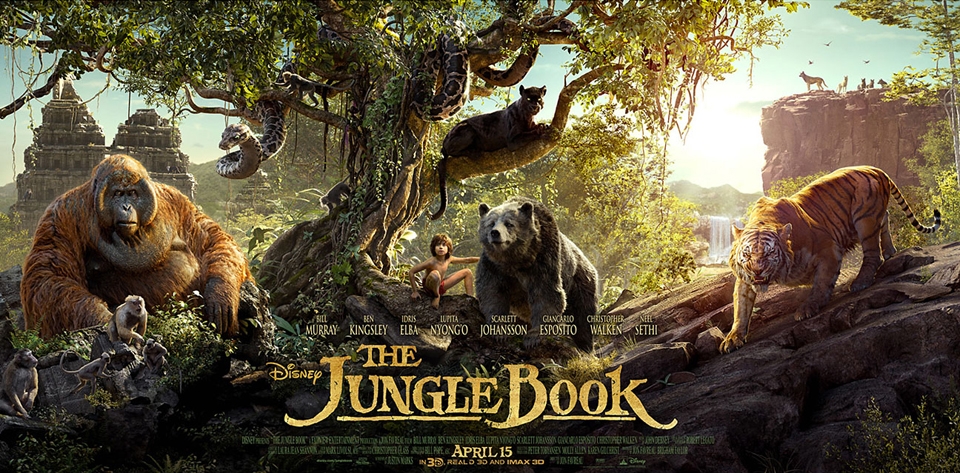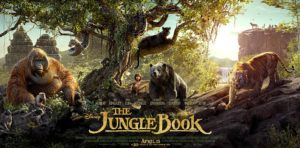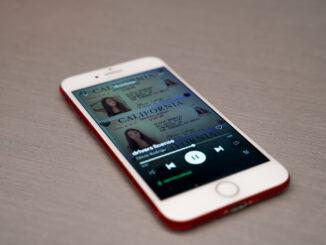
By Nicole Prieto | The Duquesne Duke

“The Jungle Book” features an all-star cast, including Idris Elba, Ben Kingsley and Scarlett Johansson. It is directed by Jon Favreau of “Iron Man” fame.
The thought of a remake or sequel might conjure some knee jerk reactions from longtime Disney animation fans — e.g., direct-to-DVD disasters such as “The Little Mermaid II.” But they should rest assured that 2016’s live-action remake of “The Jungle Book” is a rise above the rest.
Mowgli (Neel Sethi) is a man-cub raised by a pack of wolves under the mentorship of Bagheera (Ben Kingsley), a panther. His peaceful lifestyle is disrupted with the arrival of the Water Truce and of Shere Khan (Idris Elba) — a tiger with a vendetta against humans. When Shere Khan threatens to come after the boy upon the end of the truce, Mowgli’s adopted family makes the difficult decision to send him toward the Man Village to escape the tiger’s wrath.
At times, a star-studded cast may signal some compensating for a subpar production. Think Jackie Chan and Jet Li in “The Forbidden Kingdom” or Jerry Seinfeld and Renée Zellweger in “Bee Movie.” For “The Jungle Book,” it was just the icing on top of a pretty satisfying cake. Idris Elba’s power and range are on display as Shere Khan, whose only goal is to kill Mowgli by his own claws. Scarlett Johansson is the sinister python, Kaa, whose hypnotic gaze reveals the truth of Mowgli’s abandonment as a toddler. Rounding out the rest of the cast are Kingsley, Bill Murray (Baloo), Lupita Nyong’o (Raksha), Giancarlo Esposito (Akela) and Christopher Walken (King Louie), who provide stellar voice work overall.
With respect to visuals, do not expect anything as convincing as the CGI tiger in “Life of Pi.” For something touted as a live-action adaption, it is disappointing that the graphics are lacking in innovation. Nevertheless, the atmosphere is portrayed well. Kaa blends in effectively with the dark branches and vines she slithers around in, and bright colors complement Mowgli’s scenes with Baloo very well.
Unsurprisingly, a higher realism bar has not stopped Disney from doing some heavy anthropomorphizing. While not necessarily egregious, the deviation from natural animal expressions harms the film more than it needs to. The wolves boast stiff faces that contort oddly when they emote. King Louie looks a bit too eerily like Walken, and Shere Khan somehow seems less threatening the longer he glares at any given character.
Musically, the film’s score is unremarkable, with the exception of songs from the 1967 original. King Louie’s “I Wanna Be Like You” rendition is far more ominous than its animated counterpart — for good reason. Here, King Louie is more akin to a mob boss, who tries to extort the secrets of the “red flower,” or manmade fire, from Mowgli in exchange for protecting him from Shere Khan. “The Bare Necessities” will likely remain stuck in viewers’ heads long after they leave the theater. Kaa’s “Trust in Me” surfaces in the animated portions of the film’s credits, which are worth the few extra minutes lost by sitting through them.
Aside from some human villagers’ silhouettes against the backdrop of a giant bonfire, Mowgli is the only “live” being onscreen. Sethi holds his own against his animated surroundings; his expressiveness convinces the audience of Mowgli’s triumph as he solves problems with human “tricks” — crafting ropes, platforms and swings from natural resources. He does not stand out as an odd presence among the entirely animated cast, and the only thing to nitpick is the fast pace of a handful of his lines.
Perhaps the film’s greatest strength is its precise execution. A lot happens, and it is not hard to imagine plot points that could have gotten tangled up or dropped altogether. But every scene and metaphor has a valid purpose or complement: Mowgli’s weaknesses as a wolf-adoptee contrast his strengths as a human; Shere Khan’s hatred of humanity is tied to burns he received from Mowgli’s father; and Mowgli earns the elephants’ help after saving one of their young from a pit.
As a live-action remake, “The Jungle Book” resists the temptation to be something dramatically darker or more “grown up” than its animated predecessor. There are a few jump-scares, sure, but this is a family film meant to captivate the attention of children and adults alike. Overall, its message is simple but well-executed: Be proud of what makes you unique. The movie is an unapologetic adventure that does not need to contrive deeper ulterior motives to have a meaningful effect on viewers. With tight pacing, watchable visuals and a hint of nostalgia, “The Jungle Book” is a promising sign for Disney remakes to come.



